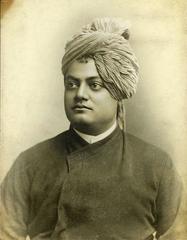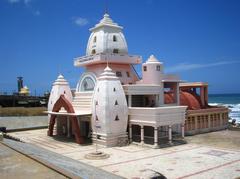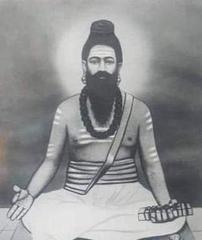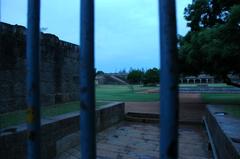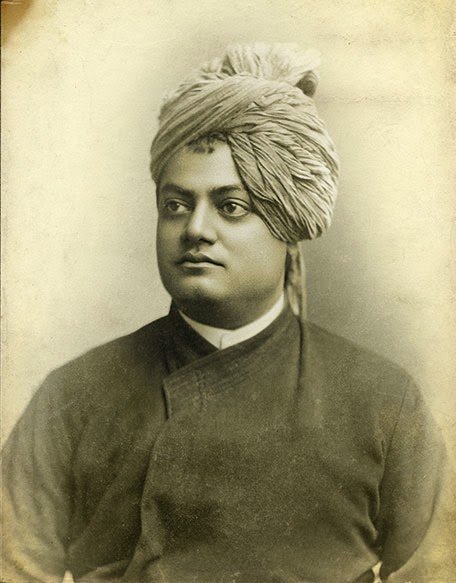
Visiting Dhyan Mandapam in Kanyakumari: Hours, Tickets, and Tips
Date: 16/07/2024
Introduction
Dhyan Mandapam in Kanyakumari is a site of profound spiritual and cultural significance. Situated at India’s southernmost tip, Kanyakumari, historically known as Cape Comorin, has served as a cultural and architectural hub influenced by various dynasties, including the Cholas, Cheras, and Pandyas. The Dhyan Mandapam is part of the larger Vivekananda Rock Memorial complex, inaugurated in 1970 to honor Swami Vivekananda, who meditated on the rock where the memorial now stands. Spearheaded by Eknath Ranade, the construction of the memorial was a monumental task supported by thousands of workers and donors from around the globe. Designed to blend traditional Indian and modern architectural styles, Dhyan Mandapam provides an ideal environment for meditation and reflection, making it a haven for spiritual seekers. The serene surroundings and the spiritual legacy associated with Swami Vivekananda attract visitors from all walks of life, offering them a unique and enriching experience. This comprehensive guide aims to provide detailed information on Dhyan Mandapam’s history, cultural significance, visitor information, nearby attractions, local cuisine, and practical travel tips, ensuring a memorable visit to this sacred site.
Table of Contents
- Historical Background and Significance
- Architectural Significance
- Cultural and Spiritual Significance
- Swami Vivekananda’s Legacy
- Visitor Experience
- Practical Information
- Local Cuisine
- Safety Tips
- Transportation
- Accommodation
- Local Etiquette
- FAQ
Historical Background and Significance
Dhyan Mandapam, located in Kanyakumari, India, is a significant spiritual and cultural landmark. The town of Kanyakumari itself has a rich history, dating back to ancient times when it was known as Cape Comorin. The region has been a hub for various dynasties, including the Cholas, Cheras, and Pandyas, who have left their mark on its cultural and architectural heritage.
The Dhyan Mandapam was constructed as a part of the larger Vivekananda Rock Memorial complex, which was inaugurated in 1970. The memorial was built to honor Swami Vivekananda, a revered Indian monk who is said to have attained enlightenment on the rock where the memorial now stands. The construction of the memorial was a monumental task, involving the efforts of thousands of workers and the support of numerous donors from across India and the world. The project was spearheaded by Eknath Ranade, a dedicated follower of Swami Vivekananda, who played a crucial role in bringing the vision to life (Vivekananda Rock Memorial).
Architectural Significance
The architecture of Dhyan Mandapam is a blend of traditional Indian and modern styles. The structure is designed to provide a serene and contemplative environment for meditation and reflection. The mandapam, or pavilion, is built using granite and features intricate carvings and sculptures that depict various aspects of Indian spirituality and mythology. The design of the mandapam is intended to create a sense of harmony and balance, reflecting the principles of Vastu Shastra, the ancient Indian science of architecture (Vastu Shastra).
One of the most striking features of Dhyan Mandapam is its central meditation hall, which is designed to accommodate a large number of visitors. The hall is adorned with murals and paintings that depict scenes from the life of Swami Vivekananda and other spiritual leaders. The use of natural light and ventilation in the design of the hall creates a tranquil and uplifting atmosphere, making it an ideal space for meditation and introspection.
Cultural and Spiritual Significance
Dhyan Mandapam holds immense cultural and spiritual significance for visitors from around the world. The mandapam is dedicated to the practice of dhyana, or meditation, which is a central aspect of many Indian spiritual traditions. The serene environment of the mandapam provides an ideal setting for individuals to engage in meditation and connect with their inner selves.
The mandapam also serves as a venue for various cultural and spiritual events, including lectures, workshops, and retreats. These events are often organized by the Vivekananda Kendra, a spiritual organization that promotes the teachings of Swami Vivekananda. The Kendra plays a vital role in preserving and promoting the cultural heritage of India, and its activities at Dhyan Mandapam attract visitors from all walks of life (Vivekananda Kendra).
Swami Vivekananda’s Legacy
Swami Vivekananda’s association with Kanyakumari and the Dhyan Mandapam adds to the site’s significance. Swami Vivekananda visited Kanyakumari in 1892, and it was here that he meditated on a rock off the coast, which later became the site of the Vivekananda Rock Memorial. During his meditation, Swami Vivekananda is said to have received a vision that inspired him to spread the message of Vedanta and Indian spirituality to the world.
The teachings of Swami Vivekananda emphasize the importance of self-realization, service to humanity, and the unity of all religions. These principles are reflected in the activities and programs conducted at Dhyan Mandapam, making it a place of inspiration and learning for visitors. The mandapam serves as a reminder of Swami Vivekananda’s enduring legacy and his contributions to the spiritual and cultural renaissance of India (Swami Vivekananda).
Visitor Experience
Meditation at Dhyan Mandapam
Visitors to Dhyan Mandapam can expect a unique and enriching experience. The mandapam is open to people of all faiths and backgrounds, and it provides a peaceful environment for meditation and reflection. The central meditation hall is equipped with comfortable seating and is designed to minimize distractions, allowing visitors to focus on their practice.
Exhibits and Displays
In addition to meditation, visitors can explore the various exhibits and displays that provide insights into the life and teachings of Swami Vivekananda. The mandapam also features a library and reading room, where visitors can access a wide range of books and resources on spirituality, philosophy, and Indian culture.
Nearby Attractions
The surrounding area of Kanyakumari offers numerous attractions for visitors, including the Kanyakumari Temple, the Thiruvalluvar Statue, and the Gandhi Memorial. These sites, along with Dhyan Mandapam, make Kanyakumari a destination of great historical, cultural, and spiritual significance (Kanyakumari Tourism).
Practical Information
Dhyan Mandapam Visiting Hours
The Dhyan Mandapam is open daily from 6:00 AM to 6:00 PM. It is advisable to check for any changes in opening hours during public holidays or special events.
Dhyan Mandapam Tickets
There is a nominal entry fee for visiting Dhyan Mandapam. Tickets can be purchased at the entrance. Special discounts may be available for students, senior citizens, and groups.
Accessibility
The Dhyan Mandapam is accessible to visitors with disabilities. Ramps and handrails are provided to ensure ease of access.
Guided Tours and Events
Guided tours of the Dhyan Mandapam and the Vivekananda Rock Memorial are available. These tours provide detailed insights into the history and significance of the site. Additionally, various cultural and spiritual events are held throughout the year, which visitors can participate in.
Dress Code
Visitors are expected to dress modestly when visiting Dhyan Mandapam. Traditional Indian attire such as sarees, salwar kameez, or long skirts for women, and kurta-pajamas or trousers and shirts for men are recommended. Avoid wearing shorts, sleeveless tops, or any revealing clothing. Comfortable footwear is advisable as you may need to walk or stand for extended periods.
Photography and Mobile Phones
Photography is generally allowed in the exterior areas of Dhyan Mandapam, but it is prohibited inside the meditation hall to maintain a serene and undisturbed environment. Mobile phones should be kept on silent mode or switched off to avoid disturbing other visitors. Always check for specific signage regarding photography restrictions.
Meditation Sessions
Dhyan Mandapam offers guided meditation sessions at specific times during the day. These sessions are usually held in the morning and evening. It is recommended to arrive at least 15 minutes before the session begins to find a comfortable spot and settle in. The sessions are free of charge, but prior registration may be required during peak tourist seasons.
Local Cuisine
South Indian Thali
A visit to Kanyakumari is incomplete without indulging in a traditional South Indian Thali. This elaborate meal typically includes rice, sambar, rasam, poriyal (stir-fried vegetables), kootu (vegetable and lentil stew), appalam (papad), curd, and a variety of pickles. The thali offers a balanced mix of flavors and is a wholesome meal that reflects the culinary diversity of Tamil Nadu.
Seafood Delicacies
Given its coastal location, Kanyakumari is a haven for seafood lovers. Freshly caught fish, prawns, crabs, and lobsters are prepared in various styles, from spicy curries to grilled and fried dishes. Popular seafood dishes include Meen Kuzhambu (fish curry), prawn masala, and crab fry. Many local restaurants and beachside shacks offer these delicacies, providing a true taste of the region’s culinary heritage.
Appam with Stew
Appam, a type of pancake made from fermented rice batter and coconut milk, is a popular breakfast item in Kanyakumari. It is often served with a vegetable or meat stew, which is a mildly spiced curry made with coconut milk. The combination of the soft, fluffy appam and the rich, creamy stew is a culinary delight that should not be missed.
Banana Chips
A popular snack in Kanyakumari, banana chips are made from raw bananas that are thinly sliced and deep-fried until crispy. These chips are often seasoned with salt or spices and are a perfect accompaniment to tea or coffee. They are widely available in local markets and make for a great souvenir to take back home.
Filter Coffee
No visit to South India is complete without savoring a cup of traditional filter coffee. Made using a metal filter, this coffee is strong, aromatic, and typically served with milk and sugar. The unique brewing method and the use of locally grown coffee beans give it a distinct flavor that is cherished by coffee lovers. Many local cafes and restaurants in Kanyakumari serve this delightful beverage.
Nanjil Nadu Cuisine
Nanjil Nadu, the region encompassing Kanyakumari, has a unique culinary tradition that blends Tamil and Kerala influences. Dishes like Nanjil Nadu fish curry, made with tamarind and coconut, and Nanjil Nadu chicken curry, known for its rich, spicy gravy, are local favorites. These dishes are often accompanied by rice or traditional breads like parotta.
Safety Tips
Hydration
Carry a water bottle and stay hydrated, especially if you are visiting during the warmer months.
Sun Protection
Use sunscreen, wear a hat, and carry sunglasses to protect yourself from the sun.
Personal Belongings
Keep your personal belongings secure and be mindful of your surroundings to avoid petty theft.
Local Customs
Respect local customs and traditions. For example, remove your shoes before entering the meditation hall and avoid loud conversations.
Transportation
Kanyakumari is well-connected by road, rail, and air. The nearest airport is Trivandrum International Airport, approximately 90 km away. Kanyakumari Railway Station is well-connected to major cities in India. Local transportation options include taxis, auto-rickshaws, and buses. It is advisable to pre-book your transportation, especially during peak tourist seasons.
Accommodation
There are various accommodation options available near Dhyan Mandapam, ranging from budget hotels to luxury resorts. Some recommended options include:
Sparsa Resort
A luxury resort offering comfortable rooms and modern amenities (Sparsa Resort).
Hotel Sea View
A mid-range hotel with sea-facing rooms and excellent service (Hotel Sea View).
Tri Sea Hotel
A budget-friendly option with basic amenities and a convenient location (Tri Sea Hotel).
Local Etiquette
Greetings
A traditional greeting with folded hands (Namaste) is appreciated.
Language
While Tamil is the official language, many locals understand and speak English. Learning a few basic Tamil phrases can be helpful.
Tipping
Tipping is not mandatory but appreciated. A 10% tip is considered generous in restaurants and for services.
FAQ
What are the opening hours of Dhyan Mandapam?
Dhyan Mandapam is open daily from 6:00 AM to 6:00 PM.
Is there an entry fee for Dhyan Mandapam?
There is a nominal entry fee. Special discounts may be available for students, senior citizens, and groups.
Are guided meditation sessions available?
Yes, guided meditation sessions are held in the morning and evening. Prior registration may be required during peak tourist seasons.
What is the best time to visit Dhyan Mandapam?
The best time to visit is between October and March when the weather is pleasant.
Conclusion
Dhyan Mandapam in Kanyakumari stands as a testament to India’s rich spiritual and cultural heritage. With its serene environment, architectural beauty, and deep spiritual significance, it offers a unique and transformative experience for visitors. The mandapam’s association with Swami Vivekananda further enhances its importance, making it a center for meditation, cultural activities, and spiritual learning. Nearby attractions like the Vivekananda Rock Memorial, Thiruvalluvar Statue, and Kanyakumari Beach provide additional opportunities for exploration and reflection. Visitors can also indulge in the local cuisine, which offers a rich culinary experience. Whether you are a seasoned meditation practitioner or a curious traveler, Dhyan Mandapam in Kanyakumari promises a journey of self-discovery and spiritual enrichment. For more travel tips and updates, download our mobile app Audiala, check out related posts on our blog, and follow us on social media to stay connected.
References
- Visiting Dhyan Mandapam, Kanyakumari - Hours, Tickets, History, and Travel Tips. (2024). Vivekananda Rock Memorial.
- Essential Guide to Visiting Dhyan Mandapam in Kanyakumari - Hours, Tickets, and Tips. (2024). Vivekananda Rock Memorial.
- Exploring Dhyan Mandapam and Nearby Attractions in Kanyakumari - A Guide to Visiting Hours, Tickets, and Local Cuisine. (2024). Tamil Nadu Tourism.
- Swami Vivekananda. (2024). Britannica.
- Vastu Shastra. (2024). Vastu Shastra Guru.
- Padmanabhapuram Palace. (2024). Kerala Tourism.
- Suchindram Temple. (2024). Tamil Nadu Tourism.
